跟动词不定式和动名词作宾语的练习题
接动词不定式(to do)做宾语的动词以及接动名词(doing)作宾语的动词

接动词不定式(to do)做宾语的动词
决心学会有希望( decidelearnwishhope)
同意计划莫假装(agreeplanpretend)
忘记拒绝会失望(forgetrefusefail)
准备设法来帮忙(preparetrymanagehelp)
提供请求负担起(offerbegafford)
记得阻止理应当(remember stopbe supposed)
接动名词(doing)作宾语的动词
【速记口诀】
Mrs.P Black missed a beefbag.(P·布莱克夫人丢了一个牛肉袋。
)
【妙语诠释】该句话中每个字母代表了一个动词或短语,这些动词要求后面跟动名词作宾语。
这些动词分别是:
m=mind介意,r=risk冒险,s=succeed in成功,p=practice练习,b=be busy忙于,l=look forward to期待,a=admit承认,c=can't help忍不住,k=keep on继续,m=miss错过,i=insist on坚持,s=suggest建议,s=stop停止,e=enjoy享受,d=delay取消,a=avoid阻止,b=be worth值得做,a=advise建议,g=give up放弃。
初中英语动词不定式与动名词综合练习20题

初中英语动词不定式与动名词综合练习20题1. ()is good for your health.A. To exerciseB. ExercisingC. ExercisesD. Exercise答案:A 。
解析:动词不定式To exercise 作主语,表示“锻炼”这个行为,动名词Exercising 也可作主语,但在本句中To exercise 更符合表达习惯。
2. He wants ()a doctor when he grows up.A. to beB. beingC. isD. are答案:A 。
解析:want to do sth. 是固定短语,“想要做某事”,所以用to be ,表示“想要成为” 。
3. My mother decided ()shopping this afternoon.A. to goB. goingC. goesD. went答案:A 。
解析:decide to do sth. 是固定搭配,“决定做某事”,故选to go 。
4. It's important ()English well.A. to learnB. learningC. learnsD. learned答案:A 。
解析:It's + 形容词+ to do sth. 是常用句型,“做某事是……的”,这里用to learn ,表示“学好英语是重要的” 。
5. They hope ()to Beijing next week.A. to goB. goingC. goesD. went答案:A 。
解析:hope to do sth. 是固定用法,“希望做某事”,所以选to go 。
6. ()is good for your health.A. RunningB. RunC. Runs答案:A。
解析:动名词Running 作主语,表示“跑步”这个动作,B 选项Run 是动词原形,不能作主语,C 选项Runs 是第三人称单数形式,也不能作主语。
中考英语固定搭配+短语+专项练习题
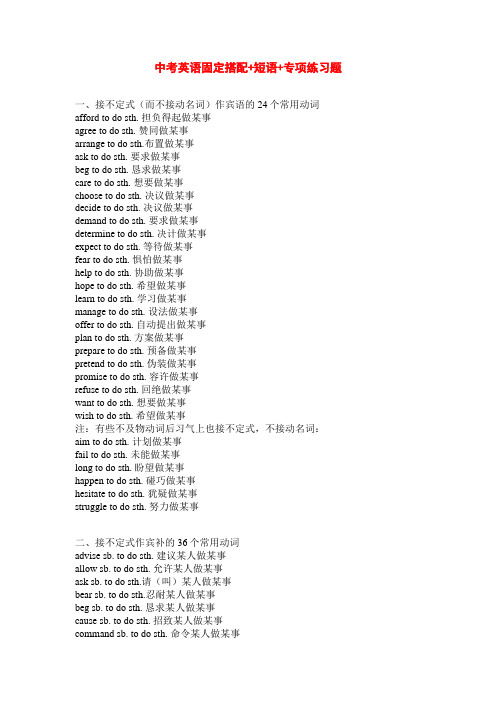
中考英语固定搭配+短语+专项练习题一、接不定式(而不接动名词)作宾语的24个常用动词afford to do sth. 担负得起做某事agree to do sth. 赞同做某事arrange to do sth.布置做某事ask to do sth. 要求做某事beg to do sth. 恳求做某事care to do sth. 想要做某事choose to do sth. 决议做某事decide to do sth. 决议做某事demand to do sth. 要求做某事determine to do sth. 决计做某事expect to do sth. 等待做某事fear to do sth. 惧怕做某事help to do sth. 协助做某事hope to do sth. 希望做某事learn to do sth. 学习做某事manage to do sth. 设法做某事offer to do sth. 自动提出做某事plan to do sth. 方案做某事prepare to do sth. 预备做某事pretend to do sth. 伪装做某事promise to do sth. 容许做某事refuse to do sth. 回绝做某事want to do sth. 想要做某事wish to do sth. 希望做某事注:有些不及物动词后习气上也接不定式,不接动名词:aim to do sth. 计划做某事fail to do sth. 未能做某事long to do sth. 盼望做某事happen to do sth. 碰巧做某事hesitate to do sth. 犹疑做某事struggle to do sth. 努力做某事二、接不定式作宾补的36个常用动词advise sb. to do sth. 建议某人做某事allow sb. to do sth. 允许某人做某事ask sb. to do sth.请(叫)某人做某事bear sb. to do sth.忍耐某人做某事beg sb. to do sth. 恳求某人做某事cause sb. to do sth. 招致某人做某事command sb. to do sth. 命令某人做某事drive sb. to do sth .驱使某人做某事elect sb. to do sth. 选举某人做某事encourage sb. to do sth. 鼓舞某人做某事expect sb. to do sth. 希冀某人做某事forbid sb. to do sth. 制止某人做某事force sb. to do sth. 强迫某人做某事get sb. to do sth. 使(要)某人做某事hate sb. to do sth. 厌恶某人做某事help sb. to do sth. 协助某人做某事intend sb. to do sth. 计划要某人做某事invite sb. to do sth. 约请某人做某事leave sb. to do sth. 留下某人做某事like sb. to do sth. 喜欢某人做某事mean sb. to do sth. 计划要某人做某事need sb. to do sth. 需求某人做某事oblige sb. to do sth. 迫使某人做某事order sb. to do sth. 命令某人做某事permit sb. to do sth. 允许某人做某事persuade sb. to do sth. 压服某人做某事prefer sb. to do sth. 宁愿某人做某事request sb. to do sth. 要求某人做某事remind sb. to do sth. 提示某人做某事teach sb. to do sth .教某人做某事tell sb. to do sth. 通知某人做某事train sb. to do sth. 训练某人做某事trouble sb. to do sth. 费事某人做某事want sb. to do sth. 想要某人做某事warn sb. to do sth. 正告某人做某事wish sb. to do sth. 希望某人做某事注:不要受汉语意思的影响而误用以下动词句型:汉语说:“惧怕某人做某事”,但英语不说fear sb. to do sth.。
动词不定式和动名词的练习题

A. have B. to have C. how to have D. to how have
5.__A___ is not easy to speak good English.
A. It
B. That
C. This
47. You had better _D___ home at once. Don't keep
your mother_____.
A. to, wait
B. going, waiting
C. to go, to wait
D. go, waiting
48. __C__ in the sun is bad for your eyes.
45. You don't look well. Why _C__ to see the doctor?
ቤተ መጻሕፍቲ ባይዱ
A. not to go
B. you motto go
C. not go
D. didn't go
46. Have you read the book? It's worth__C___.
A. read B. to read C. reading D. to reading
20.I saw him __B__ football on the playground.
A. played
B. play
C. to play
21.John seems __C____ it.
A. knows
B. know
C. to know
22.Mary’s business isC____ care of children.
不定式和动名词答案解析

不定式和动名词答案解析不定式+动名词(30题)1. ____ the structure of the plant is necessary for every student learning agriculture.A. Having studiedB. StudyC. To studyD. StudiedC. 不定式短语放在句首作主语。
对学习农业的学生来说,研究植物的结构是非常必要的。
2. “How did James Bond escape from the locked confine?”“Oh, you know he always manages ____ a tight situation.”A. to get out ofB. getting out ofC. to have got him out ofD. in getting out ofA. manage只跟不定式做宾语。
“詹姆斯邦德是如何从被锁的地方逃出来的?”“你知道他在紧要关头总能设法逃脱。
”3. The professor let him ____ early enough to catch the last bus.A. to leaveB. leaveC. leavingD. to be leavingB. 在表示感觉的动词feel, hear, see, watch, observe, listen to, look at, notice以及使役动词let, make, have等后面作宾补的不定式要省去to。
教授让他提早离开以便赶上尾班车。
4. The law requires all cars ____ for safety.A. regularly testedB. be regularly testedC. to be regularly testedD. being regularly testedC.require sb. to do sth. 动词不定式做宾补。
跟动词不定式和动名词作宾语的练习题
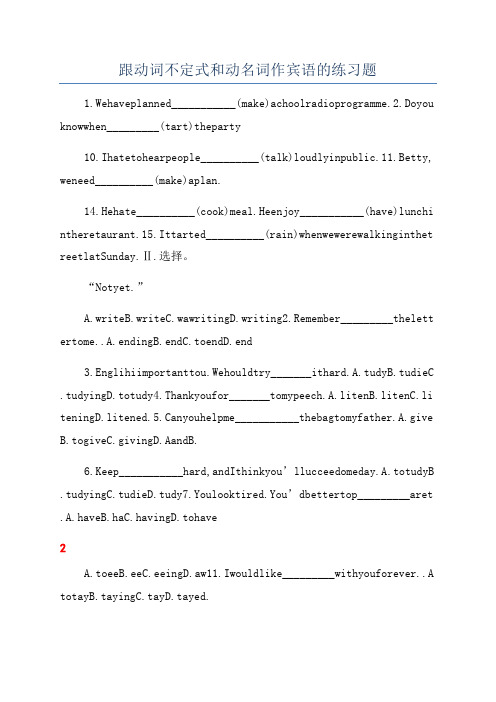
跟动词不定式和动名词作宾语的练习题1.Wehaveplanned___________(make)achoolradioprogramme.2.Doyou knowwhen_________(tart)theparty10.Ihatetohearpeople__________(talk)loudlyinpublic.11.Betty, weneed__________(make)aplan.14.Hehate__________(cook)meal.Heenjoy___________(have)lunchi ntheretaurant.15.Ittarted__________(rain)whenwewerewalkinginthet reetlatSunday.Ⅱ.选择。
“Notyet.”A.writeB.writeC.wawritingD.writing2.Remember_________thelett ertome..A.endingB.endC.toendD.end3.Englihiimportanttou.Wehouldtry_______ithard.A.tudyB.tudieC .tudyingD.totudy4.Thankyoufor_______tomypeech.A.litenB.litenC.li teningD.litened.5.Canyouhelpme___________thebagtomyfather.A.giveB.togiveC.givingD.AandB.6.Keep___________hard,andIthinkyou’llucceedomeday.A.totudyB .tudyingC.tudieD.tudy7.Youlooktired.You’dbettertop_________aret .A.haveB.haC.havingD.tohave2A.toeeB.eeC.eeingD.aw11.Iwouldlike_________withyouforever..A totayB.tayingC.tayD.tayed.12.Theytart_________anEngliharticleforthenewpaper.A.writeB.w ritingC.writeD..writed13.Damingneed_________moreEnglihinandoutofcla.A.peakB.pokenC .topeakD.peaking14.Myfatherwant__________aroundtheworldbecaueheenjoy_____new place.A.traveling,eeingB.totravel,toee.C.traveling,toeeD.totrave l,eeing15..Canyoutellme________ontheInternetA.howtoearchB.howearchC.wherecanIearchD.whencanIearch高三语法专题练习:动名词和不定式做宾语的区别1.Iwouldappreciate__________backthiafternoon.A.youtocallB.youcallC.yourcallingD.you’recalling2.Sheenjoy_ _________lightmuic.A.tohearB.hearingC.liteningtoD.tolitento3.Youcankeepthebooku ntilyou__________.A.havefinihedreadingB.finihtoreadC.willfinihreadingD.havefin ihedtoread4.Aliaidthathewouldn’tmind_________aloneathome.3A.leftB.beingleftC.tobeleftD.leaving5.Ifyoukeep__________Eng lih,youcanlearnEnglihwell.A.practiingpeakB.practiingpeakingC.practiingtopeakD.topracti epoken6.Ourmonitoruggeted__________adicuionoftheubject.A.tohaveB.houldhaveC.haveD.having7.Weareconidering_________a newplan.A.makingB.beingmadeC.tomakeD.tohavemade8.Thequirrelwaoluckyt hatitjutmied__________.A.catchingB.tobecaughtC.beingcaughtD.tocatch9.Canyouimaginey ourelf__________onadeertilandA.tayingB.tayC.havetayedD.beingtayed10.Wecanundertandwhyheav oid__________tou.A.topeakB.peechC.havingpokenD.peaking11.Pleaee某cuemy_________inwithout_________.A.openingB.toopenC.havingopenedD.tohaveopened13.She_________ _thekey.4A.admittedtakingB.admittedtakingC.admittedhavingtakenD.admit tedtohavetaken14.Igottothetationearlierthanother.Icouldn’trik__ _________thetrain.A.miingB.wouldmiC.tomiD.mied15.Ihope__________ himaoonapoible.A.eeB.eeingC.toeeD.tohaveeen16.Ie某pected__________you rfriend,butmycarbrokedownontheway.A.I’llmeet B.meetingC.tomeetingD.tomeet17.Weareplanning__________Europethiu mmer.A.topayaviitB.payaviittoC.viitingD.toviit18.Shetoldmethatheh addecided__________again.A.benotlateB.notbelateC.nottobelateD.tobenotlate19.Almotever yonefail__________onthefirttry.A.inpainghidriver’tetB.topahidriver’tetC.tohavepaedhidrive r’tetD.painghidriver’tet20.Thetwoweaverpretended__________veryhard,thoughtheydidnoth ingattheloom.A.workB.workingC.tobeworkedD.tobeworking21.Whenhegotoffthetr ain,ithappened__________.A.torainB.toberainingC.rainingD.toraining522.Ididn’t__________ituntilyouhade某plainedhow.A.managetodoB.managedtodoC.managetohavedoneD.managedoing23.T heyoungdriveroffered_________thepatientoutofthecar.A.tohandB.handingC.handD.wouldhand24.Thewhitehorerefued_____ _____thetonewall.A.topendingB.topendC.withpendingD.onpend答案:1-5CCABB6-10DACAD11-15DACAC16-20DDCBD21-25BAABB622.Ididn’t__________ituntilyouhade某plainedhow.A.managetodoB.managedtodoC.managetohavedoneD.managedoing23.T heyoungdriveroffered_________thepatientoutofthecar.A.tohandB.handingC.handD.wouldhand24.Thewhitehorerefued_____ _____thetonewall.A.topendingB.topendC.withpendingD.onpend答案:1-5CCABB6-10DACAD11-15DACAC16-20DDCBD21-25BAABB6。
英语动名词与动词不定式练习30道
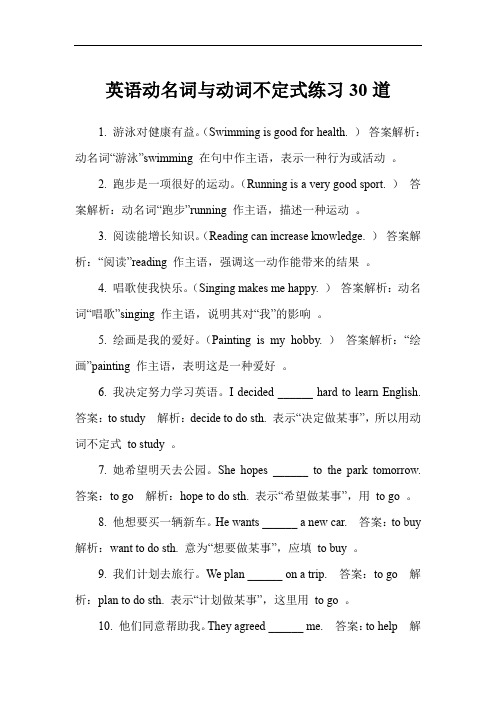
英语动名词与动词不定式练习30道1. 游泳对健康有益。
(Swimming is good for health. )答案解析:动名词“游泳”swimming 在句中作主语,表示一种行为或活动。
2. 跑步是一项很好的运动。
(Running is a very good sport. )答案解析:动名词“跑步”running 作主语,描述一种运动。
3. 阅读能增长知识。
(Reading can increase knowledge. )答案解析:“阅读”reading 作主语,强调这一动作能带来的结果。
4. 唱歌使我快乐。
(Singing makes me happy. )答案解析:动名词“唱歌”singing 作主语,说明其对“我”的影响。
5. 绘画是我的爱好。
(Painting is my hobby. )答案解析:“绘画”painting 作主语,表明这是一种爱好。
6. 我决定努力学习英语。
I decided ______ hard to learn English. 答案:to study 解析:decide to do sth. 表示“决定做某事”,所以用动词不定式to study 。
7. 她希望明天去公园。
She hopes ______ to the park tomorrow. 答案:to go 解析:hope to do sth. 表示“希望做某事”,用to go 。
8. 他想要买一辆新车。
He wants ______ a new car. 答案:to buy 解析:want to do sth. 意为“想要做某事”,应填to buy 。
9. 我们计划去旅行。
We plan ______ on a trip. 答案:to go 解析:plan to do sth. 表示“计划做某事”,这里用to go 。
10. 他们同意帮助我。
They agreed ______ me. 答案:to help 解析:agree to do sth. 意思是“同意做某事”,所以是to help 。
作主语和宾语的用法浅析及练习和答案-

动词不定式与动名词作主语和宾语的用法浅析一、作主语动词不定式和动名词都具有名词的特征,所以都可以在句中作主语。
1.不定式作主语(1)To do her homework often takes her one and a half hours every evening.(2)To do morning exercises every day is good for your health.(3)To learn English well is very easy for me.不定式(或不定式短语)作主语时常用"It" 来代替,称为形式主语,真正主语(不定式)放在句尾,如上面的句子可改为:(1)It often takes her one and a half hours to do her homework every evening.出现句型“It takes sb. time to do sth.”例如:①It will take the workers 3 years to build the building.②It took me only a few minutes to have breakfast.③How long did it take you to clean your room?(2)It is good for your health to do morning exercises every day.(3)It is very easy for me to learn English well.出现句型: “It is + 形+ for / of sb. to do sth.”例如:①It’s very difficult for me to walk on the ice.②It’s kind of you to help me.③It was quite important for you to say that to him at that time.当形容词表达人所具有特性时用of sb., 当形容词表达事物的特征时用for sb. 2.动名词作主语(1)Doing morning exercises is very good for your health.(2)Reading aloud is very important in learning English.(3)Getting up early is a good habit.二、作宾语1.有些动词或动词词组常用不定式作宾语,常见的有:agree , ask, choose, decide, hope, promise, want, wish, would like等;而有些动词或动词词组常用动名词作宾语,常见的有:enjoy, finish, keep, mind, miss, suggest, hate, be busy, look forward to等。
不定式和动名词作宾语巩固练习
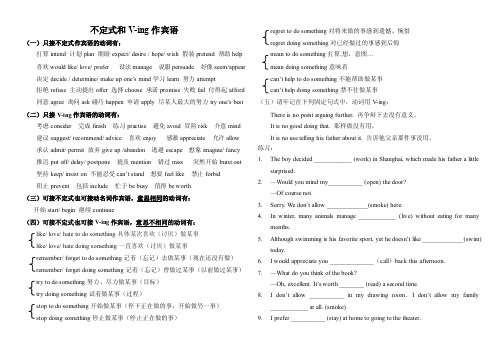
不定式和V-ing作宾语(一)只接不定式作宾语的动词有:打算intend 计划plan 期盼expect/ desire / hope/ wish 假装pretend 帮助help 喜欢would like/ love/ prefer 设法manage 说服persuade 好像seem/appear 决定decide / determine/ make up one’s mind学习learn 努力attempt拒绝refuse 主动提出offer 选择choose 承诺promise 失败fail 付得起afford 同意agree 询问ask碰巧happen 申请apply 尽某人最大的努力try one’s best (二)只接V-ing作宾语的动词有:考虑consider 完成finish 练习practise 避免avoid 冒险risk 介意mind 建议suggest/ recommend/ advice 喜欢enjoy 感激appreciate 允许allow 承认admit/ permit 放弃give up /abandon 逃避escape 想象imagine/ fancy 推迟put off/ delay/ postpone 提及mention 错过miss 突然开始burst out 坚持keep/ insist on 不能忍受can’t stand想要feel like 禁止forbid阻止prevent 包括include 忙于be busy 值得be worth(三)可接不定式也可接动名词作宾语,意思相同的动词有:开始start/ begin 继续continue(四)可接不定式也可接V-ing作宾语,意思不相同的动词有:like/ love/ hate to do something具体某次喜欢(讨厌)做某事like/ love/ hate doing something一直喜欢(讨厌)做某事remember/ forget to do something记着(忘记)去做某事(现在还没有做)remember/ forget doing something记着(忘记)曾做过某事(以前做过某事)try to do something努力、尽力做某事(目标)try doing something试着做某事(过程)stop to do something开始做某事(停下正在做的事,开始做另一事)stop doing something停止做某事(停止正在做的事)regret to do something对将来做的事感到遗憾、惋惜regret doing something对已经做过的事感到后悔mean to do something打算,想,意图…mean doing something意味着can’t help to do s omething不能帮助做某事c an’t help doing s omething禁不住做某事(五)请牢记在下列固定句式中,动词用V-ing:There is no point arguing further. 再争辩下去没有意义。
既可接不定式又可接动名词作宾语的动词

doing
sth.
1、表示记得做过某事,事情已做
I will remember to tell her about it. 我会记得把这件事告诉她。 Don't you remember telling me the story yesterday?
1、表示很遗憾地做某事,能这样用的 I regret to say that you have failed your exam.
1、不定式则用被动形式表示被动意义 Our house deserves to be done up.
deserve to do sth. 2、若后接动词为句子主语所发出的动 我们的房子需要修一修。
19、 deserve
作,则只能用不定式,不能用动名词
deserve doing sth.
1、动名词用主动形式表示被动意义
说是重要的。
3、物作主语时,常用不定式to do
意思基本没有太大差别,可以换用。 意思基本没有太大差别,可以换用。
第 1 页,共 4 页
既可接不定式又可接动名词作宾语的动词
6、 start start doing sth.
1、谈及一项长期活动或开始一种习惯 How old were you when you first started playing
can't help doing sth. 事
mother again.
当小女孩再次看到母亲时,她情不自禁地哭了起
来。
第 3 页,共 4 页
后面接动名词一般表示被动含义
既可接不定式又可接动名词作宾语的动词
21、
go on to do sth. go on
go on doing sth.
跟动词不定式和动名词作宾语的练习题
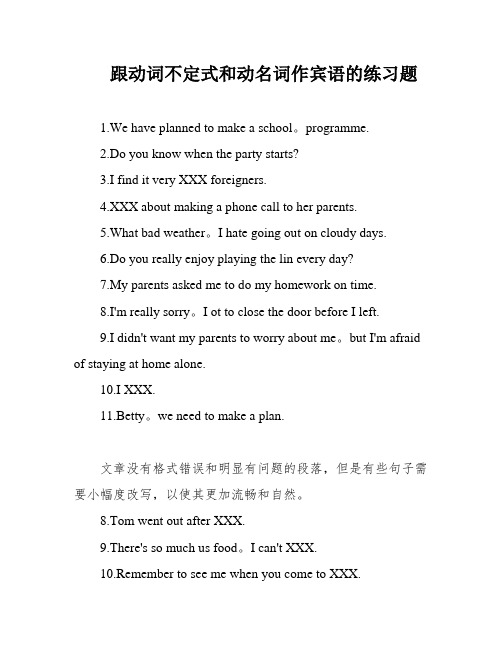
跟动词不定式和动名词作宾语的练习题1.We have planned to make a school。
programme.2.Do you know when the party starts?3.I find it very XXX foreigners.4.XXX about making a phone call to her parents.5.What bad weather。
I hate going out on cloudy days.6.Do you really enjoy playing the lin every day?7.My parents asked me to do my homework on time.8.I'm really sorry。
I ot to close the door before I left.9.I didn't want my parents to worry about me。
but I'm afraid of staying at home alone.10.I XXX.11.Betty。
we need to make a plan.文章没有格式错误和明显有问题的段落,但是有些句子需要小幅度改写,以使其更加流畅和自然。
8.Tom went out after XXX.9.There's so much us food。
I can't XXX.10.Remember to see me when you come to XXX.11.I would like to stay with you forever.12.They start writing an English article for the newspaper.13.Daming XXX English in and out of class.14.XXX around the world because he XXX.15.Can you tell me how to search on the。
不定式与动名词练习题及

不定式与动名词练习题及答案解析不定式和动名词是英语语法中的两个重要概念,它们在句子中可以作主语、宾语、宾语补足语等。
正确理解和运用不定式和动名词对于提高英语写作和翻译的能力非常重要。
下面是一些不定式和动名词的练习题以及答案解析,希望对你加深对这两个语法结构的理解有所帮助。
练习题一:将下列动词转换为不定式形式(动词已给出):1. do2. go3. have4. eat5. see答案解析:1. to do2. to go3. to have4. to eat5. to see练习题二:将下列句子中的动词转换为动名词形式(动词已给出):1. I enjoy swimming in the pool.2. He loves playing basketball with his friends.3. She hates cleaning the house on weekends.4. They are good at singing and dancing.5. We need more practice speaking English.答案解析:1. swimming2. playing3. cleaning4. singing, dancing5. speaking练习题三:选择正确的形式填空(不定式或动名词):1. He doesn't mind _______ (wait) for a few more minutes.2. I can't help _______ (laugh) at his jokes.3. Would you like _______ (join) us for dinner?4. She enjoys _______ (read) books in her free time.5. They decided _______ (visit) their grandparents this summer.答案解析:1. waiting2. laughing3. to join4. reading5. to visit练习题四:根据句子结构,选择正确的不定式和动名词形式:1. _______ (Swim) is her favorite sport.2. I enjoy _______ (swim) in the pool.3. She needs _______ (buy) some new clothes.4. His dream is _______ (become) a famous actor.5. I want _______ (go) to the beach this weekend.答案解析:1. Swimming2. swimming3. to buy4. to become5. to go练习题五:根据中文提示,选择正确的不定式和动名词形式:1. 我喜欢游泳。
动词不定式动名词作宾语练习题
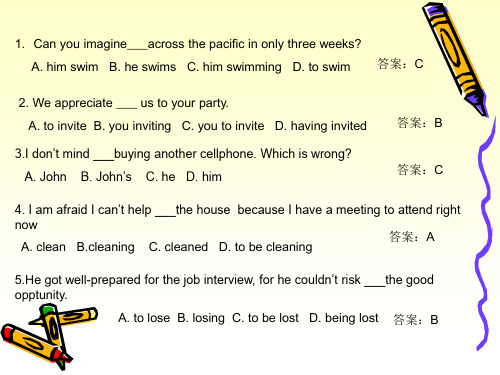
答案:C
30. Missing the train means ______for an hour.
A. to wait
B. to be waited C. being waited
D. waiting 答案:D
31. I meant __________ you, but I was so busy.
B. to strike C. striking D. struck
答案:B
24. The police forbid _____ here. A. park B. parking C. to park D. to be parked
25. The heavy rain forbade me ______to school.
3.I don’t mind ___buying another cellphone. Which is wrong? A. John B. John’s C. he D. him
答案:B 答案:C
4. I am afraid I can’t help ___the house because I have a meeting to attend right
A. is used to live
B. used to live
C. is used to living
D. used to living
答案:B
23. The clock was beginning _____twelve and everybody held their breath.
A. strike
答案:A
A. to call on B. calling on C. to call at D. calling at
高二英语动词不定式和动名词用法区别练习题20题
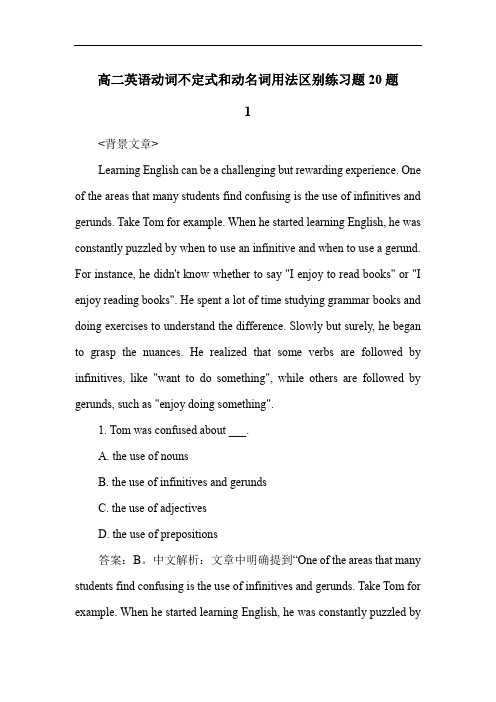
高二英语动词不定式和动名词用法区别练习题20题1<背景文章>Learning English can be a challenging but rewarding experience. One of the areas that many students find confusing is the use of infinitives and gerunds. Take Tom for example. When he started learning English, he was constantly puzzled by when to use an infinitive and when to use a gerund. For instance, he didn't know whether to say "I enjoy to read books" or "I enjoy reading books". He spent a lot of time studying grammar books and doing exercises to understand the difference. Slowly but surely, he began to grasp the nuances. He realized that some verbs are followed by infinitives, like "want to do something", while others are followed by gerunds, such as "enjoy doing something".1. Tom was confused about ___.A. the use of nounsB. the use of infinitives and gerundsC. the use of adjectivesD. the use of prepositions答案:B。
(完整版)初中英语八年级动词不定式与动名词专项练习

(完整版)初中英语⼋年级动词不定式与动名词专项练习初中英语⼋年级动词不定式与动名词专项练习⼀、动词不定式的⽤法1)作主语To learn English well is not easy. 或It is not easy to learn English well.2)作表My wish is to become a teacher.3)作宾语Most of us like to watch football matches.4)作宾语补⾜语He told me to be here on time.5)作定语I have nothing to say about that thing.6)作状语He stopped to have a look.否定形式:not + to + 动词原形构成例如:He asked me not to make such a mistake. 2、动词不定式与疑问词连⽤:例如:(1) He doesn’t know how to use the mach ine. (不定式作宾语)(2) How to use the machine is a question. (不定式作主语)(3) The question is when to go there. (不定式作表语)3、省to 的动词不定式1)使役动词let, have, make:2)感官动词see, watch, look at, notice, hear, listen to, smell, feel, find 等后作宾补,省略to。
3)would rather,had better + do4、不定式的特殊句型:1)too…to…:太…⽽不能…He is too excited to speak.2)enough to do:⾜以做…The child is old enough to go to schooll3)Why not +动词原形"表达向某⼈提出建议Why not take a holiday?4)so as (not) to do: 表⽰⽬的Go in quietly so as not to wake the baby. ⼆、动词的-ing形式:1.动词的-ing形式⽤作动名词:1)动名词作主语Walking is good exercise. ⾛路是很好的运动2)动名词作表语My favorite sport is swimming. 我最喜欢的运动是游泳。
高二英语动名词作宾语单选题30题

高二英语动名词作宾语单选题30题1. I enjoy ______ books in my spare time.A. readingB. to readC. readD. reads答案:A。
本题考查动名词作宾语。
enjoy 后接动名词作宾语,A 选项reading 是动名词形式;B 选项to read 是动词不定式;C 选项read 是动词原形;D 选项reads 是动词的第三人称单数形式。
所以选择A。
2. He is used to ______ early in the morning.A. get upB. getting upC. got upD. gets up答案:B。
be used to 表示“习惯于”,其中to 是介词,后接动名词,B 选项getting up 是动名词形式;A 选项get up 是动词原形;C 选项got up 是过去式;D 选项gets up 是第三人称单数形式。
故选B。
3. She can't help ______ when she hears the funny story.A. laughB. to laughC. laughingD. laughed答案:C。
can't help 表示“忍不住”,其后接动名词,C 选项laughing 是动名词;A 选项laugh 是动词原形;B 选项to laugh 是动词不定式;D 选项laughed 是过去式。
所以答案是C。
4. We avoid ______ mistakes in the exam.A. makeB. to makeC. makingD. makes答案:C。
avoid 意为“避免”,其后接动名词,C 选项making 是动名词;A 选项make 是动词原形;B 选项to make 是动词不定式;D 选项makes 是第三人称单数形式。
因此选C。
5. They suggested ______ for a walk after dinner.A. goB. to goC. goingD. goes答案:C。
动名词作宾语或介词宾语

动名词作宾语或介词宾语1.在很多动词后都可跟动名词作宾语:Have you finished cleaning the windows窗子擦好了吗Would you mind shutting the door劳驾把门关上行吗I enjoyed working there.我在那里工作很高兴;Our house needs painting.我们的房子需要油漆;能跟这种宾语的动词很多,常见的有:stop, suggest, remember, begin, like, start, mind, continue, can’t help等;2.有些动词可以跟动名词作宾语也可用不定式作宾语,意思上没有太大差别,如:Do you like playing chess你喜欢下棋吗to playThey began talking about something else.他们开始谈别的事;to talk有时两者在意思上有差别:I remember seeing you somewhere.记得在哪里见到过你;Remember to post the letter.记得把信发掉;3.动名词作介词宾语的时候也很多,特别是在某些成语后,如:Are you interested in going with us你有兴趣和我们一块儿去吗He is fond of playing tennis.他很喜欢打网球;I’m thinking of going to Hangchow.我在考虑到杭州去一趟;Thank you for coming.谢谢你来;4.动名词还可和某些介词一道用作状语等:After playing chess, we watched TV.下过棋之后我们看电视; Give me a phone call before leaving home.离家前给我打个电话; I’m all for going by bus.我完全赞成坐公共汽车去; Exercises:1. 在下面句子中作宾语的动名词短语下划线:1 He enjoys teaching.2 She kept talking.3 She disliked my working late.4 Forgive my ringing up so early.5 I remember telling her about you.6 She liked reading short stories.7 Then we stopped talking.8 Would you mind telling her about it9 He admitted taking the money.10 They began talking about their school days.2. 在下面用作介词宾语的动名词下划线:1 I don’t feel like eating anything now.2 I’ve got used to working at night.3 I’m proud of having a friend like you.4 She was keen on coming to Chine.5 I never dreamed of meeting you in China.6 My sister is fond of reading picture books.3. 在下面句子中的介词短语下划线:1 We can’t live without eating.2 They were surprised at your doing that.3 Since returning from Xi’an, I was awfully busy.4 She left without saying good-bye to us.5 What have you been doing besides writing the book6 He was praised for working so hard.不定式作主语和宾语2007年09月11日19:10 北文图书不定式作主语和宾语1.不定式短语常可用作主语:To see is to believe.眼见为实;To act like that is foolish.这样做是愚蠢的;2.在很多情况下我们都把不定式往后移,前面用先行词it作形式上的主语,这样句子结构会显得更平稳;这时谓语可以是:1be+形容词:It’s difficult to learn English well.学好英语不容易;2be+形容词+for引起的短语:It’s hard for me to answer.我很难回答;3be+形容词+of引起的短语:It’s kind of you to think so much of us.难得你为我们这样着想;4be+名词:It’s our duty to do that.这样做是我们的职责;5其他形式的谓语:How long does it take to get there到那里需要多少时间3.不定式短语作宾语的时候极多,例如:She is learning to swim.她在学游泳;He promised to help us.他答应帮助我们;4.有些动词后可跟一个带有连接副代词的不定式作宾语:I don’t know how to answer.我不知道该怎样回答;She will tell you what to do.她会告诉你该怎么做;5.有时还可用it作形式上的宾语,把不定式放到后面去:I don’t think it necessary to do that.我想这样做不必要;He felt it his duty to point that out.他感到有责任指出这一点; Exercises:1. 在下面句子的主语下划线:1 To smoke so many cigarettes is bad for your health.2 It’s difficult to answer the question.3 It’s nice to be with you.4 It’s impossible to get there in two hours.5 It’s our duty to help them.6 How long does it take to get there7 It made her angry to hear that.8 It isn’t right not to help them.9 It is an honour to be invited to visit the country.10 It’s easy to answer that question.2. 在下面句子的宾语下划线:1 She agreed to go there with us.2 They decided to go there by train.3 He promised to help us.4 Do you wish to go there with us5 They will show you how to do the work.6 I did not know how to translate the sentence.7 Helen found it hard to get on with them.8 Do you think it easy to learn English9 They considered it better not to go.10 She felt it her duty to take care of the children.不定式作定语和状语2007年09月11日19:10 北文图书不定式作定语和状语1.不定式短语作定语时很多,特别是在某些句型中:Do you have anything more to say你还有什么话要说吗I want to get something to read.我要找些资料看;There is nothing to be worried about.没有什么事值得发愁;We need someone to take care of the children.我们需要人看孩子;2.有些名词后常可用不定式作定语:It’s time to go to bed.是睡觉的时候了;You have no right to do that.你没有权利这样做;That’s the best way to do the work.这是做这工作最好的办法;I’d like to have a chance to see him again.我希望有机会再见到他;3.不定式有时可用作状语,表示目的、结果、原因等:I went to town to buy some books.我进城去买书;I’ve come to learn from you.我是来向你们学习的;What have I said to make you so angry我说了什么话使你这样生气She lived to be ninety.她活到了九十岁;I’m glad to see you.看到你我很高兴;We are proud to be students of China.作为中国的学生我们感到自豪;4.还可用来表示某方面:She is always ready to help others.她总是乐于帮助别人;We were eager to go home.我们亟于想回家;Be careful not to catch cold.当心别感冒;The book is easy to understand.这书容易懂;She was too young to understand that.她太年轻不懂这一点; Exercises:1. 在作定语的不定式短语下划线:1 I have a lot of things to do today.2 There are two letters to be typed.3 Let’s go and get something to drink.4 There’s no need to worry at all.5 We have a right to know.6 I had nothing to do that night.7 She didn’t have the courage to tell you that.8 That’s probably the only thing to do now.9 There is no need to worry.10 He is not a man to bow before difficulties.2. 在作状语的不定式短语下划线:1 They ran over to welcome us.2 I’m sorry to hear that.3 They are eager to take part in the job.4 The girls are easy to get along with.5 You are right to say so.6 She was glad to see us.7 Never too old to learn.8 It was too late to do anything now.9 She was unwilling to take the job.10 To be frank, I don’t like the idea.动名词的句法作用2007年09月11日19:10 北文图书动名词的句法作用1.动名词起名词的作用,在句中可作:1主语:Fishing is prohibited.禁止垂钓;2表语:My favourite sport is skiing.我最喜欢的运动是滑雪;3宾语:I suggested going by plane.我建议坐飞机去;4介词的宾语:She is fond of swimming.她喜欢游泳;5定语:This is your boarding pass.这是你的登机证;在很多情况下动名词和名词已构成合成词:opening speech开幕词waiting-room候车室living room客厅sleeping pill安眠药deep-ploughing深耕close-planting密植weightlifting举重family-planning计划生育2.有些动名词已经名词化,前面可加冠词,可用定语修饰,甚至有复数形式:You should give the room a good cleaning.你把房间好好打扫一下;Who did the recording是谁录的音Please take our greetings to him.请向他问好;The work needs careful planning.这工作需要周密计划;3.有些动名词已完全成为名词:Let’s bring in the washing.咱们去把洗好的衣服收进来;The story has a happy ending.这故事有个愉快的结局;Exercises:1. 在下面句子中的动名词下划线并说明它在句中的作用:1 Smoking is prohibited.2 The only thing that interests her is dancing.3 They insisted on going by plane.4 I like reading short stories.5 What can we learn by watching such movies6 Do you mind my sitting here7 They insisted on my staying there for supper.8 I’m thinking of going to London.9 She takes no interest in my working there.10 Running is my favourite sport.11 Her job is raising pigs.12 Seeing is believing.2. 把下面合成名词译为汉语:1 reading-room2 parking space3 sitting room4 washing machine5 job-hunting6 living standard7 handwriting8 sight seeing9 washing-powder10 air-conditioning3. 在下面句子的真正主语下划线:1 It’s nice talking to you.2 It’s no use doing that.3 It’s no good arguing with him.4 It’s a waste of time going there now.动名词作宾语或介词宾语2007年09月11日19:10 北文图书动名词作宾语或介词宾语1.在很多动词后都可跟动名词作宾语:Have you finished cleaning the windows窗子擦好了吗Would you mind shutting the door劳驾把门关上行吗I enjoyed working there.我在那里工作很高兴;Our house needs painting.我们的房子需要油漆;能跟这种宾语的动词很多,常见的有:stop, suggest, remember, begin, like, start, mind, continue, can’t help等;2.有些动词可以跟动名词作宾语也可用不定式作宾语,意思上没有太大差别,如:Do you like playing chess你喜欢下棋吗to playThey began talking about something else.他们开始谈别的事;to talk有时两者在意思上有差别:I remember seeing you somewhere.记得在哪里见到过你; Remember to post the letter.记得把信发掉;3.动名词作介词宾语的时候也很多,特别是在某些成语后,如:Are you interested in going with us你有兴趣和我们一块儿去吗He is fond of playing tennis.他很喜欢打网球;I’m thinking of going to Hangchow.我在考虑到杭州去一趟; Thank you for coming.谢谢你来;4.动名词还可和某些介词一道用作状语等:After playing chess, we watched TV.下过棋之后我们看电视; Give me a phone call before leaving home.离家前给我打个电话; I’m all for going by bus.我完全赞成坐公共汽车去; Exercises:1. 在下面句子中作宾语的动名词短语下划线:1 He enjoys teaching.2 She kept talking.3 She disliked my working late.4 Forgive my ringing up so early.5 I remember telling her about you.6 She liked reading short stories.7 Then we stopped talking.8 Would you mind telling her about it9 He admitted taking the money.10 They began talking about their school days.2. 在下面用作介词宾语的动名词下划线:1 I don’t feel like eating anything now.2 I’ve got used to working at night.3 I’m proud of having a friend like you.4 She was keen on coming to Chine.5 I never dreamed of meeting you in China.6 My sister is fond of reading picture books.3. 在下面句子中的介词短语下划线:1 We can’t live without eating.2 They were surprised at your doing that.3 Since returning from Xi’an, I was awfully busy.4 She left without saying good-bye to us.5 What have you been doing besides writing the book6 He was praised for working so hard.现在分词的句法作用2007年09月11日19:10 北文图书现在分词的句法作用1.现在分词和动名词同形,在句中可构成各种进行时态参阅时态各节:It is raining hard.雨下得很大;现在进行时He was writing a letter.他在写信;过去进行时What have you been doing你在干什么现在完成进行时2.除了构成谓语外,现在分词还可:1用作表语:The story is very interesting.这故事很有趣;The day was so charming.天气十分怡人;2用作定语:China is a developing country.中国是一个发展中国家;The house is a charming museum now.这房子现在是一座迷人的博物馆;3用作状语:He is busy answering letters.他在忙着给人回信;Let’s go fishing.咱们钓鱼去吧;4用来构成复合宾语:We saw a girl running towards us.我们看见一个女孩向我们跑来;I heard someone knocking at the door.我听见有人敲门;3.有不少现在分词可用作表语,表示主语的特征:The water was quite refreshing.水使人清新;One of the boys is missing.有一个男孩不见了;“That’s amazing,”Jack said.“这太使人吃惊了,”杰克说;The film was very amusing.这部电影很有趣;能这样用的分词很多,如amusing, charming, discouraging, exciting, interesting, inviting, missing, amazing, shocking, surprising等;Exercises:1. 在下面句子中的分词或分词短语下划线,并说出它们在句中的作用:1 Do you see the man walking down the street2 I see him passing my house every day.3 I went shopping this morning.4 A boy came running out of the house.5 He found the boys stealing his apples.6 He fired, wounding one of the wolves.7 The teacher told us an amusing story.8 Who knows the missing word in this sentence9 We saw some peasants working in the fields.10 I don’t like to see singing birds in cages.11 We went boating on the lake.12 He said he had seen a flying saucer.2. 在下面句子中作表语的分词下划线:1 The weather was charming.2 The story was quite amusing.3 Skiing is more exciting than skating.4 Her photograph was missing.5 Such views are shocking to me.6 The matter is pressing.7 The old man’s views are shocking.8 These reports are confusing.9 What he said was rather disappointing.10 Some of the letters are exciting.现在分词作定语和状语2007年09月11日19:10 北文图书现在分词作定语和状语1.现在分词作定语时很多,有时单独作定语,放在所修饰的词前面:He is a promising young man.他时一个有培养前途的青年;It is a fascinating city.这是一座迷人的城市;Wisconsin is the leading dairy state.威斯康星乳牛产品领先各州;They are visiting in a neighbouring town.他们在临近一座城市访问;2.也可引起一个短语,放在所修饰的词后面:There is someone knocking at the door.有人在敲门;I know a man working in that factory.我认识一个在那家工厂干活的人;The girl sitting beside me is my cousin.坐在我旁边的姑娘是我的表妹;Do you know the man talking to her和她说话的男子你认识吗3.现在分词也有时可用作状语,修饰谓语,表示:1同时发生的另一动作:A boy came running in.一个男孩跑进屋来;I went shopping with mother in town.我和妈妈一道进城买东西;Following Tom, they started to climb.他们跟着汤姆往上爬;2原因:Not knowing the way, he couldn’t go there.由于不知道路,他无法到那里去;Being excited, she couldn’t go to sleep.因为激动她睡不着;3时间:Hearing the news, we jumped with joy.听到这消息时我们高兴得跳了起来; Turning around, he saw a tiger running up.他转过身时看到一只老虎跑了过来; 有时和when或while连用:They got engaged when traveling in Europe.他们在欧洲旅游时订了婚;His fingers trembled while doing so.他这样做时手指颤抖了一下; Exercises:1. 在下面句子中作定语的分词或分词短语下划线:1 He is a promising young man.2 It is a fascinating city.3 He was one of the leading composers of the time.4 Who is the girl standing on her hands5 They built a road leading to the village.6 Who knows the missing words in the sentence7 My aunt told us an amusing story.8 In our village live 350 families belonging to three nationalities.9 There is a car waiting at the door.10 Don’t wake the sleeping child.2. 在下面句子中由分词或分词短语表示的状语下划线:1 Traveling by jeep, we visited a number of cities.2 We couldn’t help them, being so poor ourselves.3 Coming down the mountain, we met Jim on the way.4 We spent a lot of money rebuilding the house.5 He worked the whole afternoon trying to repair the car.6 Not knowing the language, he couldn’t get a job.7 The manager came towards us smiling.8 Having failed twice, they didn’t want to try again.9 Being a student, she was naturally interested in museums.10 Turning around, she saw a man following her.11 When leaving the airport, they waved to us again and again.12 While staying there, I learnt a lot from them.现在分词构成复合结构2007年09月11日19:10 北文图书现在分词构成复合结构1.不少动词可用现在分词构成复合宾语:I saw Tom waving to me.我看见汤姆向我挥手;He heard someone knocking at the door.他听见有人敲门;I am sorry to keep you waiting.对不起让你久等了;We found a tree lying across the road.我们发现一棵树拦在马路中间;这些都可作为句型来记,如hear somebody doing something, see somebody doing something,还有keep, notice, find, leave等动词可跟这样的宾语;2.在see, hear, notice这类动词后,有时可跟两种复合结构,一种由现在分词构成,一种由不带to的不定式构成:We saw a man standing there.我们看见一个男子站在那里;We saw a man leave the house.我们看见一个男子离开了那座房子;前者表示动作正在进行,后者表示动作业已完成,有时两种结构差别不大,可以换用,如:I often heard her singing this song.我常听见她唱这首歌;sing3.这种结构也可用于被动形式:He was often seen working in the fields.人们常常看见他在地里干活; She was once heard singing this song.有一次人们听见她唱这支歌;4.介词后间或也跟这种复合宾语:She listened to him playing the piano.她听他弹钢琴;He looked at the children playing under the tree.他看孩子们在树下玩耍; Exercises:1. 在下面句子中的复合宾语下划线:1 I watched the children dancing in the garden.2 She heard some people talking in the next room.3 He felt the house shaking.4 Do you smell something burning5 I am sorry to keep you waiting.6 His question set us all thinking.7 I noticed someone standing at the door.8 My uncle caught the children stealing his apples.9 I’ll have you all speaking English well within a year.10 He found them playing basketball.11 I have been kept waiting for two hours.12 V oices were heard calling for help.2. 在介词后的复合宾语下划线:1 Just look at the rain pouring down2 We listened to the band playing in the park.3 She wanted to leave the house without anyone seeing her.4 I should thank you instead of you thanking me.5 This story is about a girl sailing across the Atlantic alone.6 With so many people supporting us, we are sure to succeed.7 I couldn’t leave the house without anyone seeing me.8 He was like an old tree blossoming again.过去分词的句法作用2007年09月11日19:10 北文图书过去分词的句法作用1.过去分词在句子中的作用大致与现在分词相似,也可以用作:1表语:The glass is broken.玻璃杯破了;2定语:He has a sister called Julia.他有个妹妹叫朱莉娅;3状语:Greatly interested, they asked many question.他们大感兴趣问了许多问题;也可构成复合宾语:I’ll have my hair cut tomorrow.我明天理发;过去分词多有被动意思:I found the mirror broken. The mirror was broken.2.过去分词作表语:过去分词作表语时很多,多和be构成谓语a,也可和其他系动词构成谓语b:a. She is never bored.她从不感到厌烦;The machine is broken.机器坏了;I was very frightened.我很害怕;She was tired from the flight.她坐飞机坐累了;b. They got married last week.他们上星期结婚的;She looked disappointed.她显得很失望;He felt rather tired.他感到相当累;Tom seemed delighted at the idea.汤姆听了这想法似乎很高兴; Exercises:1. 在下面句子中的过去分词下划线,并说明它们的作用:1 Is the room furnished2 She entered, accompanied by her daughter.3 These are stolen goods.4 They got married last year.5 He was wounded in the leg.6 Did you ever hear the song sung in Italian7 She had a worried look on her face.8 He didn’t notice the surprised look on her face.9 She watched the child carried out of the room.10 Is there anything planned for tonight2. 在下面句子中作表语的过去分词下划线:1 Don’t get excited.2 They felt insulted.3 The door remained locked.4 She looked disappointed.5 They got engaged last winter.6 Soon I grew dissatisfied with the work.7 She seemed embarrassed by the question.8 He was terribly upset.9 She became annoyed with the children.10 The shoe string came untied.过去分词作定语和状语2007年09月11日19:10 北文图书过去分词作定语和状语1.过去分词作定语的时候也不少,单独一个词多放在所修饰词的前面a,引起的短语都放在所修饰的词后面b:a. When shall we have the written test我们什么时候考笔试I’ll have fried eggs.我要煎鸡蛋;Do you like smoked fish你喜欢熏鱼吗b. Is there anything planned for tonight今晚有什么计划的活动吗What’s the language spoken there那里讲什么语言A girl dressed in blue came into the room.一个穿蓝色衣服的姑娘走了进来;有时单独的过去分词也可放在所修饰词的后面:We still have some bread left.我们还剩一些面包;过去分词有时构成合成词作定语:a well-known musician著名的音乐家heartfelt thanks由衷的感激2.过去分词可以作状语,表示动作发生的背景a,原因b,时间c或假设情况d:a. Built in 1192, the bridge is over 800 years old.这座桥是1192年修的,已有800多年的历史了;Depressed, she went to see her mother.她情绪低落,跑去找她母亲;b. Born into a peasant family, he had only two years of schooling.由于出生农民家庭,他只上了两年的学;c. Seen from the hill =when it is seen…, the town looks magnificent.从山上看,这座城市非常美;d. Compared with you, we still have a long way to go.和你们相比,我们还有很大差距;Exercises:1. 在下面句子作定语的过去分词或过去分词短语下划线:1 This is an unexpected development.2 It is also called “The Unfinished Symphony”.3 Whose are the reserved seats4 England and Scotland united to become the United Kingdom.5 The play put on by the students was a great success.6 The experience gained will be of great value to us.7 Her father is a retired professor.8 The company was run by some returned students.9 We held a party to welcome the newly married couple.10 What do you think of the plan put forward by Professor Johnson2. 在下面句子作状语的过去分词或过去分词短语下划线:1 Guided by these principles, he worked for ten years.2 He returned to Shanghai, disguised as a merchant.3 “You’re right”she said, pleased.4 Mr. Cooper, deeply moved, thanked them again and again.5 She went home exhausted.6 Greatly interested, they asked her to sing another song.7 Compared to her sister, she was indeed very fortunate.8 Depressed, she went home.9 Urged on by hunger, he stole a loaf of bread.10 Delighted with her work, they made her the general manager.过去分词构成复合结构2007年09月11日19:10 北文图书过去分词构成复合结构1.过去分词在某些动词后构成复合结构作宾语:We’ll get her X-rayed.我们将让她去透视一下;I’ve heard him criticized many times.我听见他多次受到批评;He felt a great weight taken off his mind.他感到心头轻松了许多;She found the door locked.她发现门锁上了;Keep your mouth shut and your eyes open.谚语少说话多观察;2.这类句子也可变为被动结构:One of the glasses was found broken.有一只玻璃杯发现破了;They should be kept informed of what’s going on here.应让他们知道这里发生的情况;The door was found locked.发现门锁上了;3.在have和get后常会用到这种结构:I’ve had the stove lighted.我已让人把炉子生好;Please have the note sent to Mr. Patterson.请让人把这封信送给派特森先生; We must get the paper signed.我们必须请人把这份文件签好;I’m trying to get the book published.我正设法让人把这书出版;有时表示遭遇到的情况:He had his pocket picked.他遭到扒手扒窃;The pilot has his plane hijacked.飞行员遭到劫机;He has got his wrist broken.他的手腕骨折了;有时自己也参与这个动作:I can’t get the car started.这车我起动不了啦;Did you get the picture finished in time你及时把画画好了吗Exercises:1. 在下面句子中的过去分词下划线:1 She’s having her eyes tested.2 I have heard it said that he was a national hero.3 What made you so frightened4 He hated to see any bird killed.5 We can’t get the machine started.6 How would you like it your hair cut7 We want the work finished by June.8 I’ve just had some photos taken.9 We had the door painted last week.10 He intended to have his daughter educated in England.2. 把下面句子译为汉语:1 Go and get your hair cut.2 You will have to get that tooth filled.3 I ought to get my shoes shined this afternoon.4 He meant to get this place tidied up.5 She got her fingers caught in the door.6 Why don’t you have that suit cleaned7 He had his fingers burned last night.8 She thought of having her hair waved.9 I had my watch stolen.10 He wouldn’t have anything said against her.。
八年级英语动名词作宾语单选题30题(答案解析)
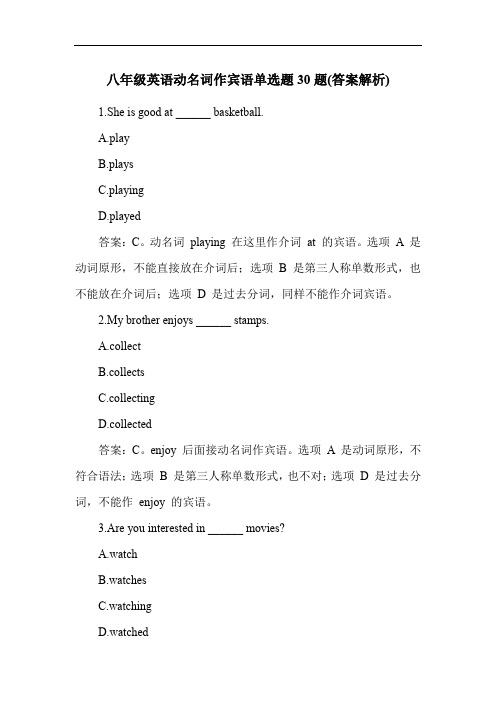
八年级英语动名词作宾语单选题30题(答案解析)1.She is good at ______ basketball.A.playB.playsC.playingD.played答案:C。
动名词playing 在这里作介词at 的宾语。
选项A 是动词原形,不能直接放在介词后;选项B 是第三人称单数形式,也不能放在介词后;选项D 是过去分词,同样不能作介词宾语。
2.My brother enjoys ______ stamps.A.collectB.collectsC.collectingD.collected答案:C。
enjoy 后面接动名词作宾语。
选项A 是动词原形,不符合语法;选项B 是第三人称单数形式,也不对;选项D 是过去分词,不能作enjoy 的宾语。
3.Are you interested in ______ movies?A.watchB.watchesC.watchingD.watched答案:C。
be interested in 后面接动名词作宾语。
选项A 是动词原形,错误;选项B 是第三人称单数形式,不行;选项D 是过去分词,不合适。
4.He spends a lot of time ______ books.A.readB.readsC.readingD.to read答案:C。
spend time (in) doing sth.,这里动名词reading 作介词in 的宾语,in 可省略。
选项A 是动词原形,不对;选项B 是第三人称单数形式,错误;选项D 是不定式,不符合这个句型。
5.Do you like ______ music?A.listen toB.listens toC.listening toD.listened to答案:C。
like doing sth.,动名词listening to 作like 的宾语。
选项 A 是动词原形短语,不能直接作like 的宾语;选项B 是第三人称单数形式短语,错误;选项D 是过去分词短语,不合适。
- 1、下载文档前请自行甄别文档内容的完整性,平台不提供额外的编辑、内容补充、找答案等附加服务。
- 2、"仅部分预览"的文档,不可在线预览部分如存在完整性等问题,可反馈申请退款(可完整预览的文档不适用该条件!)。
- 3、如文档侵犯您的权益,请联系客服反馈,我们会尽快为您处理(人工客服工作时间:9:00-18:30)。
keep 继续admit 承认appreciate 感激,赞赏avoid 避免complete 完成consider 认为deny 否认enjoy 喜欢prevent阻止finish 完成imagine 想象mind 介意practise 训练risk 冒险suggest 建议face 面对include 包括stand 忍受
b. 词组后接doing admit to prefer…to be used to lead to devote oneself to object to stick to be busy look forward to to为介词)no good, no use, It's worth… as well as can't help It's no use /good be tired of be fond of be capable of be afraid of be proud of think of / about hold off put off keep on insist on count on / upon set about be successful in good at take up give up burst out prevent … from…跟动词不定式和动名词作宾语的练习题
Ⅰ.用所给动词的适当形式填空:
1.We have planned ___________(make) a school radio programme.
2.Do you know when_________ (start) the party
3.I find it very interesting ___________(talk) with foreigners.
4.She’s thinking about __________(make)a phone call to her parents.
5.What bad weather ! I hate ____________(go ) out on cloudy days.
6.Do you really enjoy _________(play) the violin every day.
7.My parents asked me _________(do) my homework on time.
8.I’m really sorry . I forgot __________(close) the door before I left.
9.I didn’t want my parents ___________(worry) about me , but I’m afraid
_________(stay)at home alone.
10.I hate to hear people __________(talk) loudly in public.
11.B etty , we need __________(make) a plan.
12.P lease remember ______________(post) the letter for the old man.
13.S top ___________(chat), everyone. Our English teacher is coming.
14.H e hates__________(cook) meals . He enjoys ___________(have)lunch
in the restaurant.
15.I t started__________(rain) when we were walking in the street last
Sunday.
Ⅱ. 选择。
1.“Have you finished_________ your composition ”
“Not yet.”
A. write
B. writes
C. was writing
D. writing
2. Remember _________the letter to me ..
A. sending
B. sends
C. to send
D. send
3. English is important to us . We should try _______ it hard.
A. study
B. studies
C. studies
D. to study
4. Thank you for _______ to my speech.
A. listen
B. listens
C. listening
D. listened.
5. Can you help me ___________ the bag to my father.
A. give
B. to give
C. giving
D. A and B.
6. Keep ___________hard , and I think you’ll succeed someday.
A. to study
B. studying
C. studies
D. studys
7. You look tired. You’d better stop_________ a rest.
A. have
B. has
C. having
D. to have
8. Tom went out after he finished___________the sitting room.
.A clean B. cleaning C. to clean D. cleaned
9. There’s so much delicious food! I can’t decided________.
.A . what t eat B. when to eat C. how to eat D. where to eat .
10 . Remember ________ me when you come to Shouguang.
A. to see
B. see
C. seeing
D. saw
11. I would like _________ with you forever.
.A to stay B. staying C. stay D. stayed.
12. They start _________an English article for the newspaper.
A. writes
B. writing
C. write
D.. writed
13. Daming needs _________ more English in and out of class.
A. speak
B. spoken C . to spoken D. speaking
14. My father wants __________ around the world because he enjoys _____ new places.
A. traveling , seeing
B. to travel, to see .C . traveling , to see D. to travel, seeing
15.. Can you tell me ________ on the Internet
A. how to search
B. how search
C. where can I search
D. when can I search。
